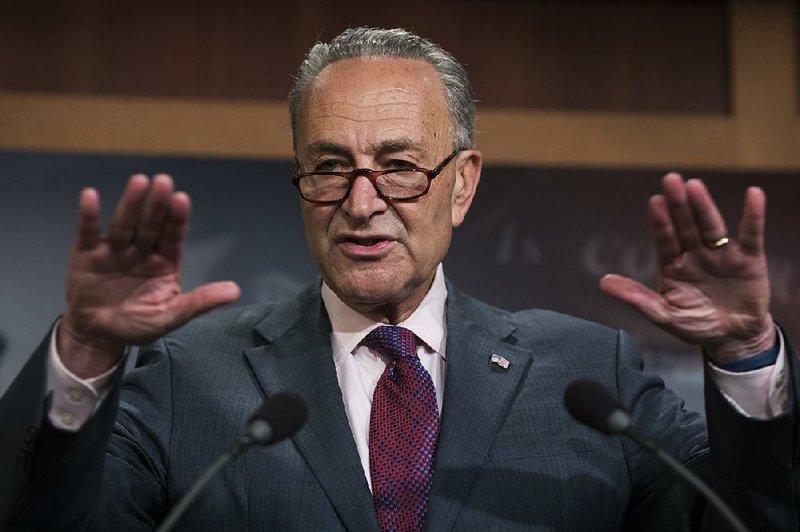WASHINGTON -- The top House and Senate Democrats said Wednesday that they had reached agreement with President Donald Trump to protect thousands of younger immigrants from deportation and fund some border security enhancements -- not including Trump's long-sought border wall.
The agreement was announced by Senate Democratic Leader Charles Schumer and House Democratic Leader Nancy Pelosi after a White House dinner that Republican lawmakers weren't invited to attend.
The deal would enshrine protections for the nearly 800,000 illegal immigrants who were brought to this country as children and who benefited from former President Barack Obama's Deferred Action for Childhood Arrivals program, which provided temporary work permits and shielded participants from deportation.
Trump earlier this month moved to end the program and gave Congress six months to come up with a legislative fix before the statuses of the program's participants begin to expire.
[PRESIDENT TRUMP: Timeline, appointments, executive orders + guide to actions in first 200 days]
"We agreed to enshrine the protections of DACA into law quickly, and to work out a package of border security, excluding the wall, that's acceptable to both sides," Pelosi and Schumer said in a joint statement that used the acronym for the program.
White House spokesman Sarah Huckabee Sanders partially disputed their characterization, saying on Twitter that "excluding the wall was certainly not agreed to."
That disagreement could scuttle the deal. Democrats have made it clear to the president that wall funding is a nonstarter, particularly in the House, where Pelosi will need to find votes from within her party to make up for Republicans who oppose granting legal status to deferred-action participants.
The White House issued a statement that mentioned the immigration program as merely one of several things that were discussed as "policy and legislative priorities."
[U.S. immigration: Data visualization of selected immigration statistics, U.S. border map]
"These topics included tax reform, border security, DACA, infrastructure and trade," the statement said. "This is a positive step toward the president's strong commitment to bipartisan solutions for the issues most important to all Americans. The administration looks forward to continuing these conversations with leadership on both sides of the aisle."
Still, it was the second time in two weeks that Trump cut out Republicans to reach a deal with Pelosi and Schumer. A person briefed on the meeting, who demanded anonymity to discuss it, said the deal specifies bipartisan legislation called the DREAM Act that provides eventual citizenship for the young immigrants.
Many House Republicans have expressed opposition to such an approach, calling it amnesty for lawbreakers. It remains to be seen how Republicans' loyalty to Trump will affect their response to a policy they would have opposed under other circumstances.
A House immigration hard-liner, GOP Rep. Steve King of Iowa, made clear that he, for one, was not happy.
Addressing Trump over Twitter, King wrote that if the reports were true, "Trump base is blown up, destroyed, irreparable, and disillusioned beyond repair. No promise is credible."
Other Republicans were more receptive. Sen. Jeff Flake of Arizona, a frequent critic of the president, said on Twitter: "Kudos to @POTUS for pursuing agreement that will protect #Dreamers from deportation." The young immigrants are often referred to as Dreamers.
White House Chief of Staff John Kelly, National Economic Council Director Gary Cohn, Treasury Secretary Steven Mnuchin, budget director Mick Mulvaney and legislative affairs director Marc Short also attended the dinner.
SEPARATING THE ISSUES
Earlier Wednesday, during a White House meeting with moderate House members from both parties, Trump had urged lawmakers to come up with a bipartisan solution for the program participants.
"We don't want to forget DACA," Trump told the members at the meeting. "We want to see if we can do something in a bipartisan fashion so that we can solve the DACA problem and other immigration problems."
Trump said then that he would be open to separating the wall issue from the question of the younger immigrants, as long as the wall was dealt with eventually.
"He said, the wall doesn't have to be necessary," Rep. Henry Cuellar, D-Texas, told reporters at the White House. "He said we're going to add [wall funding] somewhere else. ... We've told him we don't want to tie this [together]. He said, 'DACA, we're going to do it early. We're going to do some kind of border security.' He brought up the wall. He said that doesn't have to be on this DACA bill."
Democrats and some Republicans have resisted funding for a wall, saying such a structure is not worth the billions of dollars it would cost.
The number of illegal immigrants who would potentially be covered by the DREAM Act, introduced in July by Sens. Dick Durbin, D-Ill., and Lindsey Graham, R-S.C., is expected to be far larger than the number of those who have deferred-action protections.
Cuellar said that at the meeting with Trump, he told the president that the DREAM Act has sufficient bipartisan support to pass and that the White House should be pushing for a vote. Trump, Cuellar said, told the lawmakers, "Oh, it will be on the floor."
"He did say, 'We need to move on this quickly. I don't want to wait six months; people forget about it in six months,'" said Cuellar, referring to the deferred-action program.
The apparent deal is the latest example of Trump's sudden pivot to bipartisanship after months of railing against Democrats as "obstructionist." He has urged them to join him in overhauling the nation's tax code, among other priorities.
Trump, who was deeply disappointed by Republicans' failure to pass a health care overhaul, infuriated many in his party last week when he reached a three-month deal with Schumer and Pelosi to raise the debt ceiling and keep the government running as part of legislation to speed relief to states affected by recent hurricanes.
"More and more we're trying to work things out together," Trump explained Wednesday, calling the development a "positive thing" for both parties.
"If you look at some of the greatest legislation ever passed, it was done on a bipartisan manner. And so that's what we're going to give a shot," he said.
Immigration has vexed lawmakers for years. Funding for Trump's promised wall had been thought to be a major point of contention between Republicans and Democrats as they attempted to forge a deal.
House Speaker Paul Ryan, who also sat down with Pelosi to talk immigration Wednesday, said during an interview that deporting the deferred-action program participants was "not in our nation's interest."
"I wanted him to give us time. I didn't want this to be rescinded on day one and create chaos," Ryan said, arguing the time would allow Congress to "come up with the right kind of consensus and compromise to fix this problem."
Information for this article was contributed by Erica Werner, Jill Colvin, Kevin Freking and Ken Thomas of The Associated Press; by Arit John and Laura Litvan of Bloomberg News; by Maggie Haberman and Yamiche Alcindor of The New York Times; by Ed O'Keefe and David Nakamura of The Washington Post; and by Lisa Mascaro and Noah Bierman of the Tribune News Service.
A Section on 09/14/2017

